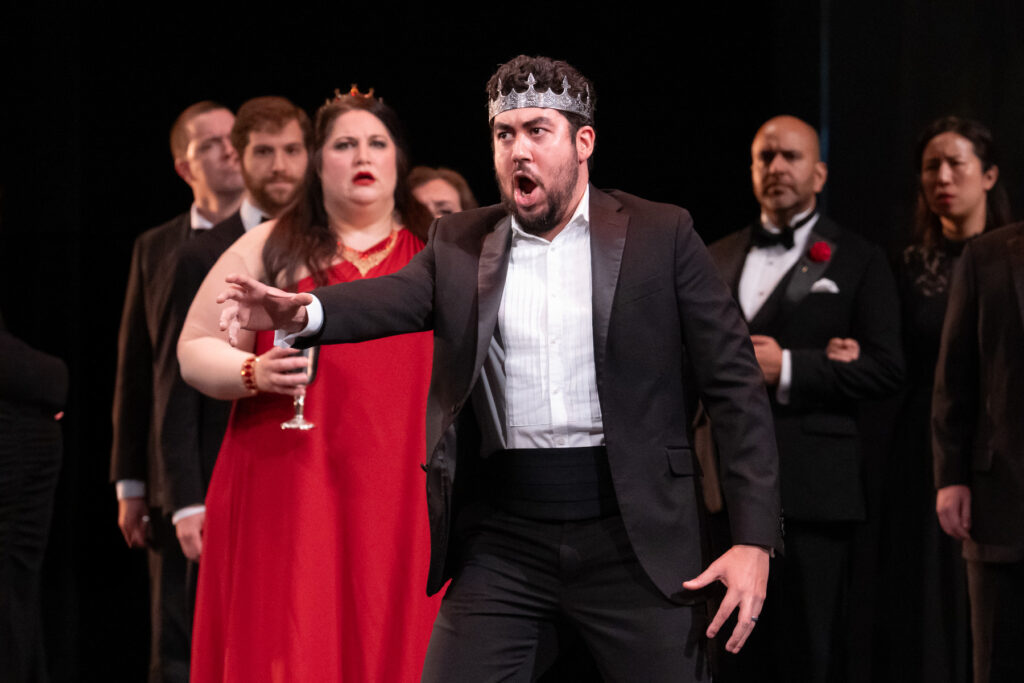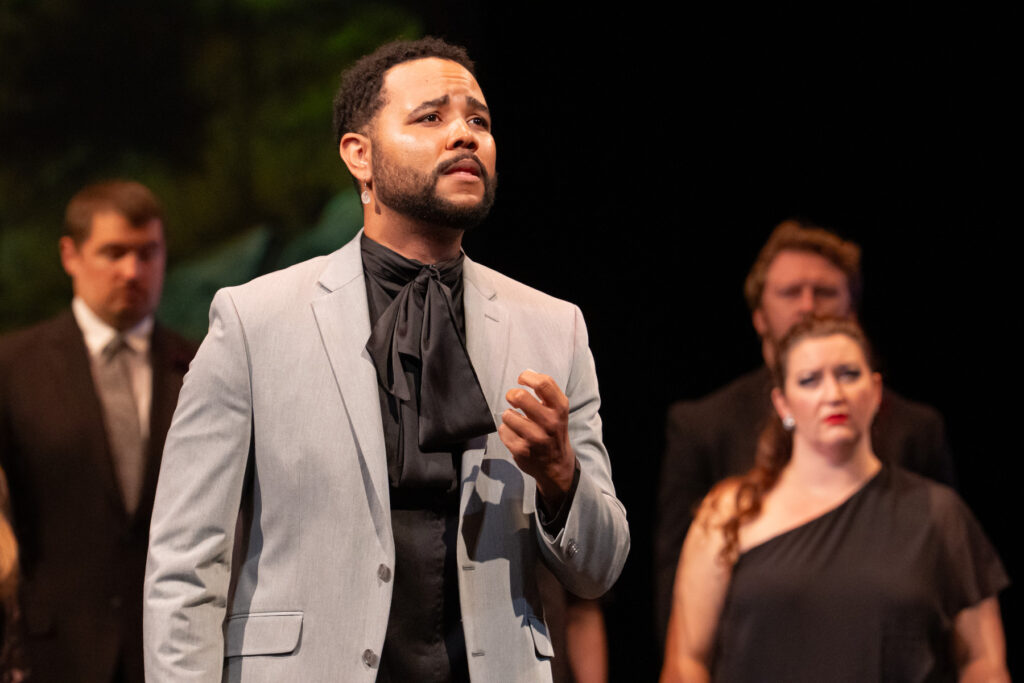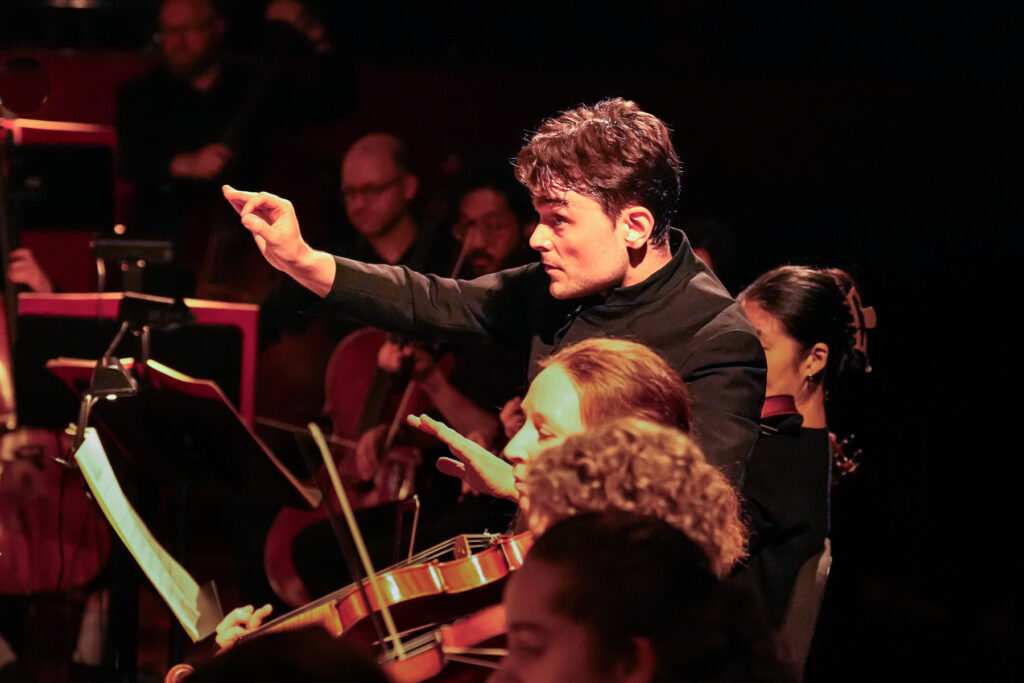Big American opera companies in America today resemble Broadway companies. They strive to fill gargantuan theaters by serving up a mix of warhorses and crossover repertoire, staged by celebrity directors, accompanied by overloud musical forces, and hyped by relentless marketing.
Teatro Nuovo flips the script. For one week each year, the company presents works from opera’s 19th century golden age. Singers appear on an empty stage without sets, costumes, or makeup. Teatro Nuovo pours its resources almost entirely into casting, coaching, and accompanying some of the world’s best emerging younger singers, who act with their voices. In the intimate space of the (lower two floors of the) New York City Center theater, an audience of about 1000 can catch every tone.

The result is the most consistently satisfying live opera in New York.
This summer Teatro Nuovo presented two operas that feature sleepwalkers. I missed Bellini’s La Sonnambula but caught Verdi’s Macbeth. Before the show, I had doubts about the company’s nod to bel canto style in programming the composer’s original 1847 version rather than Verdi revision prepared nearly two decades later for Paris. The later is what one almost always hears today: it has greater dramatic nuance, more sophisticated harmonies, complex and memorable choruses, fewer formulaic cabalettas, and a deeper portrayal of Lady Macbeth, including one of Verdi’s great dramatic arias for soprano.
Yet Teatro Nuovo’s performance was so stylistically coherent and dramatically compelling that I hardly noticed the switch. The singing and orchestral playing was the best I have heard from this company.

Whereas Verdi’s 1865 revision tempts us to center the plot on Lady Macbeth, the earlier version focuses more on Macbeth himself. Puerto Rico-born Baritone José Rivera met the challenge, commanding the stage. He translated a multi-faceted character into precise vocal colors: stentorian when addressing courtiers or soldiers, gently muffled when waking from a meeting with the witches, overwrought when encountering the ghost of Banquo, raw when faced with his own death. Like the entire cast, he sang throughout with long breaths and legato phrasing too seldom heard today—surely a sign of superb coaching behind the scenes. Memorable though this performance was, Rivera has even further room to grow into greatness: with age, his baritone is likely to gain dark-hued weight and his emotional palette to widen even further.
Greek-American soprano Alexandra Loutsion possesses an astonishingly powerful and penetrating voice. It is not uncommon for singers who also perform Wagner and Strauss, as Greek-American soprano Alexandra Loutsion has begun to do, to appear in the role of Lady Macbeth. Yet, especially in this bel canto version, it may have been too much of a good thing. Though thrilling in its sheer volume, her performance at times lacked the smooth finesse, equalized vocal emission, and timbral characterization required to make the most of the role. This proved a particular liability in her account of the anything-but-dreamy sleepwalking scene.
Verdi himself maintained that the tenor role of Macduff is unimportant. Across dozens of live and recorded performances of this opera I have experienced, I struggle to recall the name of anyone who sang it…until this performance. Texas-born and Curtis-trained Martin Luther Clark’s only aria—an Act IV lament for the death of his family—received the largest ovation of the night. Astounding breath control, poignant phasing, and clear diction showed a naturally beautiful lyric tenor voice to its best advantage. He is surely a singer to watch as he evolves into weightier roles.

Turkish Bass Cumhur Görgün only recently graduated from Philadelphia’s Academy of Vocal Arts yet is already singing Rossini’s Don Basilio at Glyndebourne. He brought subtle phasing and precise diction to the role of Banco. One hopes he will acquire the weight and depth needed for Verdi in a big house—basses mature late, after all. In this setting, it was just enough.
Verdi insisted that the three-part chorus of witches comprise a leading character. Rather than blending the voices entirely, they sang with a varied yet controlled way that allowed each distinctive voice to be heard. It suited the weird and ragged word of the witches.
Bringing it all together was Jakob Lehmann’s revelatory conducting of a historically informed orchestra. Originally a violinist, Lehmann served as concertmaster for nine previous productions at Teatro Nuovo. German-born, he now conducts historically-informed opera and concert performances across Europe and the world, specializing in performance practice of the mid-19th century. (For a beautiful and thought-provoking Schubert’s Unfinished on original instruments, click here.)
We desperately need the stylistic renovation Lehmann offers. Even the best conventional Verdi conducting today—Fabio Luisi aside—has grown symphonic: too often slow, heavy and unyielding. By contrast, Lehmann’s account of Macbeth recalled the Italianate style that still could be found through most of the 20th century. A deft underlying pulse remains toe-tappingly brisk throughout, yet leaves space for fluid and flexible legato during arias, transparent textures, snappy articulation, accelerandi to conclude arias and scenes, and all the other idiomatic touches that bring Verdi alive.
Lehmann was helped greatly by the astonishing timbral variety produced by Teatro Nuovo’s pick-up orchestra, packed with world-class original instrument virtuosos. Gut strings, woody woodwinds, and mellow brass combined to produce an immediate and commanding effect when massed, yet were always transparent and varied, with every individual part distinctly audible. I was often tempted to lean forward to ascertain precisely which instrument I was hearing and how the sound was being produced.
Teatro Nuovo offers more than a combination of meticulous preparation, authentic performance practice, idiomatic style, and dramatic intensity. It offers New Yorkers a unique opportunity to reconnect with the centuries-old grand tradition, now endangered, of opera as essentially vocal art.
Andrew Moravcsik
Macbeth, 1847 edition
Composed by Giuseppe Verdi
Libretto by Francesco Maria Piave
Macbeth, Ricardo José Rivera; Lady Macbeth, Alexandra Loutsion; Macduff, Martin Luther Clark; Banco, Cumhur Görgün; Dama, Jihye Seo; Malcolm, Romeo Lopez; Fleanzio, Olivia Trinchera Citterio; Domestico, Paul Leland Hill; Medico, Kevin Spooner; Sicario, Kellen Schrimper.
Teatro Nuovo Chorus and Orchestra. Maestro Concertatore e Direttore, Jakob Lehmann.
New York City Center, July 23
Top image: Witchs’ chorus
All photos by Steven Pisano